Related Research Articles

Traveling Wilburys were a British-American supergroup formed in Los Angeles in 1988, consisting of Bob Dylan, George Harrison, Jeff Lynne, Roy Orbison and Tom Petty. They were a roots rock band and described as "perhaps the biggest supergroup of all time".
Skiffle is a genre of folk music with influences from American folk music, blues, country, bluegrass, and jazz, generally performed with a mixture of manufactured and homemade or improvised instruments.

Anthony James "Lonnie" Donegan was a British skiffle singer, songwriter and musician, referred to as the "King of Skiffle", who influenced 1960s British pop and rock musicians. Born in Scotland and brought up in England, Donegan began his career in the British trad jazz revival but transitioned to skiffle in the mid-1950s, rising to prominence with a hit recording of the American folk song "Rock Island Line" which helped spur the broader UK skiffle movement.
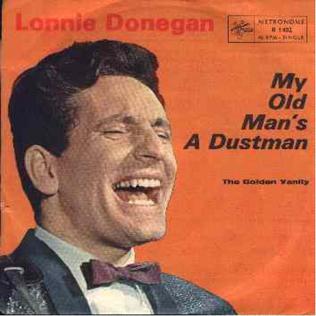
"My Old Man's a Dustman" is a song first recorded by the British skiffle singer Lonnie Donegan. It reached number one in the British, Irish, Australian, Canadian, and New Zealand singles charts in 1960. The chorus of the song is:
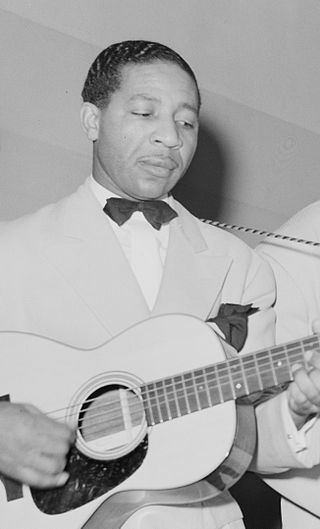
Alonzo "Lonnie" Johnson was an American blues and jazz singer, guitarist, violinist and songwriter. He was a pioneer of jazz guitar and jazz violin and is recognized as the first to play an electrically amplified violin.
John Franklin Duncan was an American bluegrass and skiffle musician. He became popular in Britain in 1957 with "Last Train to San Fernando", which reached number two in the UK Singles Chart.

Donald Christopher Barber was an English jazz musician, best known as a bandleader and trombonist. He helped many musicians with their careers and had a UK top twenty trad jazz hit with "Petite Fleur" in 1959. These musicians included the blues singer Ottilie Patterson, who was at one time his wife, and Lonnie Donegan, whose appearances with Barber triggered the skiffle craze of the mid-1950s and who had his first transatlantic hit, "Rock Island Line", while with Barber's band. He provided an audience for Donegan and, later, Alexis Korner, and sponsored African-American blues musicians to visit Britain, making Barber a significant figure in launching the British rhythm and blues and "beat boom" of the 1960s.
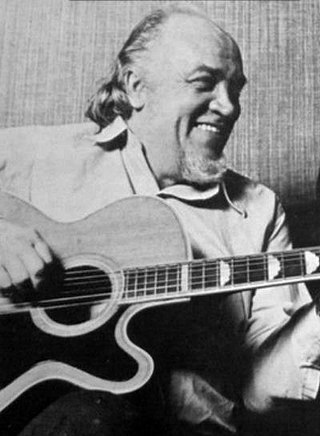
Denys Justin Wright, known professionally as Denny Wright, was a British jazz guitarist.

The Healing Game is the twenty-sixth studio album by Northern Irish singer-songwriter Van Morrison, released in 1997 by Polydor. It reached the Top Ten in four countries, and the Top Twenty in three more. Following two overtly jazz albums, it saw Morrison adding blues and a pop sensibility. It is the only album recorded after 1980 which Rolling Stone judged to be among his ten best, calling it "a clear highlight of his mid-period discography".
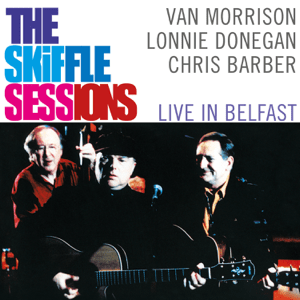
The Skiffle Sessions – Live in Belfast is a live album by Northern Irish singer-songwriter Van Morrison, with Lonnie Donegan and Chris Barber, released in 2000. Lonnie Donegan had played with the Chris Barber jazz band when he had his first hit with "Rock Island Line"/"John Henry" in 1955. He had been a childhood influence on Van Morrison, who had performed in his own skiffle band with schoolmates when he was twelve years old in Belfast, Northern Ireland. This was Donegan's second album in twenty years, reviving his career until his death in 2002.

Kenneth Colyer was an English jazz trumpeter and cornetist, devoted to New Orleans jazz. His band was also known for skiffle interludes.
"Rock Island Line" is an American folk song. Ostensibly about the Chicago, Rock Island and Pacific Railroad, it appeared as a folk song as early as 1929. The first recorded performance of "Rock Island Line" was by inmates of the Arkansas Cummins State Farm prison in 1934.
The Vipers Skiffle Group – later known simply as The Vipers – were one of the leading British groups during the skiffle period of the mid to late 1950s, and were important in the careers of radio and television presenter Wally Whyton, coffee bar manager Johnny Martyn, wire salesman Jean Van den Bosch, instrument repairer Tony Tolhurst, journalist John Pilgrim, record producer George Martin, and several members of The Shadows.
"Worried Man Blues" is a folk song in the roots music repertoire. It is catalogued as Roud Folk Song Index No. 4753. Like many folk songs passed by oral tradition, the lyrics vary from version to version, but generally all contain the chorus "It takes a worried man to sing a worried song/It takes a worried man to sing a worried song/I'm worried now, but I won't be worried long." The verses tell the story of a man imprisoned for unknown reasons "I went across the river, and I lay down to sleep/When I woke up, had shackles on my feet", who pines for his lost love, who is "on the train and gone."

"Does Your Chewing Gum Lose Its Flavour " is a novelty song by Lonnie Donegan. Released as a single in 1959, it entered the UK Singles Chart on 6 February 1959 and peaked at number three. It was also Donegan's greatest chart success in the United States, reaching number five on the Billboard Hot 100 chart in 1961.
Saturday Club was an influential BBC Radio programme in the United Kingdom, broadcast on the BBC Light Programme and later BBC Radio 1 between 1957 and 1969. It was one of the earliest – and for several years almost the only – radio programme in the country to broadcast pop music. Its longest-serving and best remembered host was Brian Matthew.
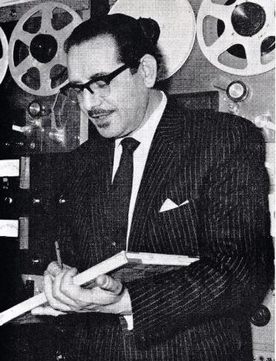
Sidney Denis Preston was a British record producer, recording studio owner, radio presenter and music critic. He was particularly influential in the British jazz and associated skiffle scenes from the 1940s to the 1960s.

"I Don't Care Anymore" is a song by English musician George Harrison, released as the B-side of the lead single from his 1974 album Dark Horse. The A-side was "Dark Horse" in the majority of countries internationally and "Ding Dong, Ding Dong" elsewhere, including the United Kingdom. It is one of Harrison's relatively rare compositions in the country music genre and, equally unusual among his 1970s releases, the recording is a solo performance.

Moving On Skiffle is the 44th studio album by Northern Irish singer-songwriter Van Morrison, released on 10 March 2023 by Exile Productions through Virgin Music. The album is Van Morrison's second in the Skiffle genre after his 2000 live album The Skiffle Sessions – Live in Belfast 1998, which saw Morrison collaborate with Lonnie Donegan and Chris Barber. Another skiffle pioneer, Chas McDevitt, was present during the recording sessions for Moving On Skiffle.
"Cat Call" is an instrumental piece, composed by Paul McCartney, recorded by the British musical group Chris Barber's Jazz Band and released in 1967 as the A side of a single.
References
- ↑ Norfolk Jazz & Jubilee Quartet: Complete Recorded Works, Vol. 4 (1927-1929) at AllMusic . Retrieved February 24, 2015.
- ↑ Mitchell's Christian Singers: Mitchell's Christian Singers, Vol. 2: 1936-1938 at AllMusic . Retrieved February 24, 2015.
- ↑ "Josh White discography" . Retrieved February 24, 2015.
- ↑ Josh White: "I Don't Care Where Dey Bury My Body" at AllMusic . Retrieved February 24, 2015.
- ↑ Leonard DePaur / Carrington Lewis / Bayard Rustin / Bill White / Josh White: "I Don't Care Where Dey Bury My Body" at AllMusic . Retrieved February 24, 2015.
- ↑ Josh White: "My Soul Is Gonna Live with God (I Don't Care Where They Bury My Body)" at AllMusic . Retrieved February 24, 2015.
- ↑ Josh White: "Bury My Body" at AllMusic . Retrieved February 24, 2015.
- ↑ Lonnie Donegan: "Bury My Body" at AllMusic . Retrieved February 24, 2015.
- ↑ Lonnie Donegan: The Skiffle Legend at AllMusic . Retrieved February 24, 2015.
- ↑ Chris Barber / Chris Barber's Jazz Band / Lonnie Donegan's Skiffle Group: "Bury My Body" at AllMusic . Retrieved February 24, 2015.
- ↑ Lonnie Donegan's Skiffle Group: "Bury My Body" at AllMusic . Retrieved February 24, 2015.
- ↑ Chris Barber / Chris Barber's Jazz Band: "Bury My Body" at AllMusic . Retrieved February 24, 2015.
- ↑ The Animals: "Bury My Body" at AllMusic . Retrieved February 24, 2015.
- ↑ The Misunderstood: The Lost Acetates 1965–1966 at AllMusic . Retrieved February 24, 2015.
- ↑ Al Kooper: "Bury My Body" at AllMusic . Retrieved February 24, 2015.
- ↑ Al Kooper / Shuggie Otis: "Bury My Body" at AllMusic . Retrieved February 24, 2015.
- ↑ Ella Jenkins: Songs, Rhythms and Chants for the Dance at AllMusic . Retrieved February 24, 2015.
- ↑ Davy Graham: Playing In Traffic at AllMusic . Retrieved February 24, 2015.
- ↑ Starlite Desperation: Show You What a Baby Won't at AllMusic . Retrieved February 24, 2015.
- ↑ Chris Barber: The Grand Reunion Concert at AllMusic . Retrieved February 24, 2015.
- ↑ "Bury My Body - 77s". 77s. June 15, 2014. Retrieved April 29, 2015.
- ↑ John Lee Hooker: Nothing But the Blues at AllMusic . Retrieved February 24, 2015.
- ↑ Gaza: I Don't Care Where I Go When I Die at AllMusic . Retrieved February 24, 2015.
- ↑ Fishboy: An Elephant at AllMusic . Retrieved February 24, 2015.
- ↑ Various Artists: Bury My Body at AllMusic . Retrieved February 24, 2015.
- ↑ Various Artists: Bury My Body, Vol. 1 at AllMusic . Retrieved February 24, 2015.
- ↑ Various Artists: Bury My Body, Vol. 2 at AllMusic . Retrieved February 24, 2015.
- ↑ Various Artists: Bury My Body Vol.2 at AllMusic . Retrieved February 24, 2015.